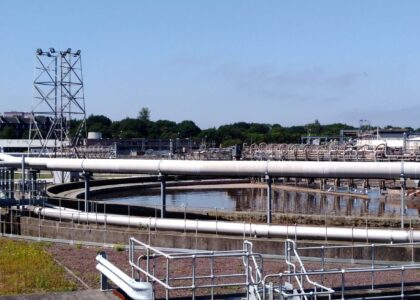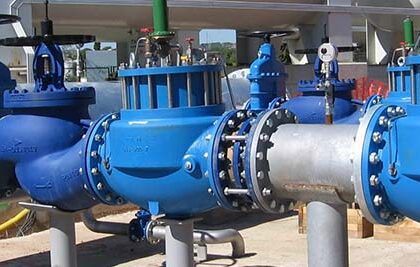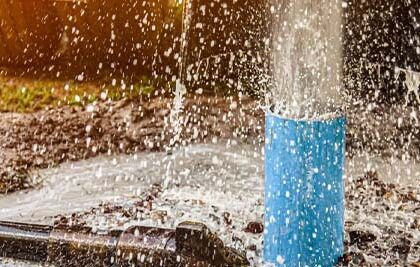It is common knowledge that WATER IS LIFE! AND WATER IS KEY FOR INDUSTRIAL GROWTH AS A BASIC RAW MATERIAL. And where there is use of water for domestic or industrial purposes, there is also mixing of water with other compounds to generate wastewater. This wastewater is required to be appropriately treated to acceptable standards before it is discharged back to the environment.
At HYDRO CONCEPTS (U) LTD, we help you select the most suited wastewater treatment method/process chain, optimally design it and undertake its construction. Our wastewater treatment specialists combine expertise in design and operation of biological, physical, and chemical wastewater treatment processes to meet our Clients’ needs for effective and efficient wastewater treatment facilities.
We design new wastewater treatment plants and upgrade existing facilities. Through our value engineering approach, we provide our Clients with designs that meet their needs while achieving the goal of minimising construction and O&M costs. We focus on systems that achieve both resource (water, energy, and nutrient) recovery. Thus, our major emphasis is on anaerobic wastewater treatment processes for tropical regions, for safely managed wastewater is an affordable and sustainable source of water, energy, nutrients, and other recoverable materials.
We design for and undertake implementation of residential, commercial, industrial or municipal wastewater treatment systems. Our selection of the processes is guided by thorough characterisation of the type of wastewater at hand while we emphasise process control. Our goal is to offer solutions that increase your production capacity and decrease your operating costs by optimising wastewater treatment energy processes.
We design and deliver fit-for-purpose industrial wastewater and effluent treatment equipment. Our range of industrial wastewater treatment equipment includes up flow anaerobic sludge blanket reactors (UASB), anaerobic baffled reactors (ABR), clarifiers, industrial oil separators, solids separators, dissolved air flotation (DAF), sludge thickening units, hydro cyclones, among others. Our effluent systems are fit for brewery, dairy, textile, wet coffee processing, sugar refineries, abattoir, food processing, leather tanning, plastics recycling, pulp and paper, chemical, beverages, tailings, and battery recycling industrial wastewater. Wastewater treatment plants vary in capacity and features, and our full spectrum of wastewater treatment technologies includes:
- Effluent treatment plants (ETPs).
- Moving bed biofilm reactors (MBBR).
- Sequencing batch reactors (SBR).
- Biological aerated filters (BAF).
- Activated sludge plants.
- Natural biological wastewater treatment facilities i.e., sewage lagoons and artificial wetlands.
- Aerobic and anaerobic clarifiers.
- Mobile wastewater treatment plants (Onsite pre-engineered compact wastewater treatment plants/ container plants for emergencies).
- Waste stabilisation ponds, trunk, and reticulation sewers.
- Sewer rehabilitation and wastewater treatment plant improvements i.e., wet weather improvements.
- Flocculation ponds/tanks.
- Water resource recovery facilities (WRRFs). We improve traditional wastewater treatment systems to modern WRRFs.
- Coagulation tanks.
- Laying of trunk sewer lines.
- Management of sewer and sewage overflows and leakages.
- Installation of micro faecal sludge treatment plants (FSTPs).
- Sanitary sewer overflows (SSOs) and odour control and management.
- Sewerage facility improvements and redevelopment of master lift stations.
- Design and installation of greywater treatment, recycling, and reuse systems.
- Trickling filter and disc filter systems.
- Underground wastewater treatment plants.
- Decanting ponds, facultative ponds, etc.
- Wastewater treatment solutions for FOG (Fats, oil, and grease). These systems remove oil emulsions, suspended solids, and organic materials from wastewater.
- Sewage pumping stations (Master lift stations).
- Wastewater treatment systems suited for heavy metal removal, removal of hydrocarbons (oil) from industrial effluents, aerobic, and anaerobic processes.
- Sludge dewatering plants.
- Development of industrial wastewater management plans/strategies.
- Performance evaluations for wastewater treatment facilities.
- Facultative membrane bioreactors (FMBR).
- Decentralised wastewater treatment systems (DEWATS) installed onsite.
- Sewer rehabilitation and wastewater treatment plant improvements.
- Remediation of volatile organic compounds (VOCs), per-and polyfluoroalkyl substances (PFAs), etc.
- Installation of recirculation biogas production and energy cogeneration systems i.e. If needed by Clients, municipal wastewater treatment plant slurries can be treated in digesters where specific bacteria are used to feed on the sewage sludge, producing biogas as a by-product.
Our wastewater treatment plants generally incorporate three levels of treatment i.e., primary, secondary, and tertiary/advanced treatment stages. These remove large particles of solid impurities, organic matter, and special pollutants respectively, ensuring the treated effluent is safe for disposal.
Our design experts tailor every treatment system to the exact requirements of the customer, including the degree of automation desired for systems equipped with programmable logic controllers (PLCs), IoT, and SCADA systems. These automation features maximise ease of operation.
We help you choose the right wastewater treatment equipment to best suit your plant’s operation. Our selection of the processes is guided by thorough characterisation of the type of wastewater (effluent characterization) at hand while we emphasise process control. Our services include treatability studies, permitting assistance, project management, EPC turnkey installations, start-up, and training. In existing wastewater treatment facilities, our services include process control, plant optimization, comprehensive performance evaluations, energy efficiency (process energy audits), and process troubleshooting.
We also offer operator training in activated sludge process control and biological nutrient removal. We undertake wastewater treatment facility planning for wet weather improvements and capital planning for overall renewal and replacements, in the case of deteriorating infrastructure that is largely dysfunctional and faced with poor level of service, and inadequate quality and quantity of effluent, either due to ageing or lack of maintenance.
We also supply the following municipal, domestic, and industrial wastewater treatment plant components:
- Jet mixers.
- Wastewater pumps and sewage pumps (High pressure sludge pumps). These wastewater pumps are used to pump influent, activated sludge, thickened or digested sludge, biosolids, scum, filtrate, effluent, or reuse water, depending on the plant configuration.
- Desalination systems for brackish water.
- Sludge dehydrators.
- Slurry pumps.
- Centrifugal pumps.
- Multistage centrifugal blowers.
- Detectors, monitors, and recorders (sampling and analysing equipment and instrumentation). We supply and configure leading edge wastewater treatment plant monitoring systems.
- Supervisory control and data acquisition (SCADA) systems. These sensors offer real-time control for parameters such as pH adjustment, turbidity monitoring, TSS probes to capture real-time data and inform automated dozing (shift from manually operated to stand-alone systems with automation); automated monitoring of wastewater quality and automated adjustment of the coagulant dosage proportionally to the actual content of suspended solids in the wastewater. Our wastewater treatment and instrumentation engineers guide you on automation options, and configuration to meet your plant’s unattended operation/standalone.
- Wastewater process automation systems i.e., programmable logic controllers (PLCs), human machine interfaces (HMIs), variable frequency drives (VFDs), and SCADA systems. We are skilled in process automation, control systems design, motor control, etc.
- Wastewater quality testing laboratory reagents, laboratory equipment, and test kits.
- Odour control chemicals for pit latrines.
- Sludge dewatering and processing equipment/screw press machines.
- Emerging technologies that enable energy recovery from biosolids i.e., combined heat and power (CHP) facilities, thus enabling onsite electricity generation and self-sufficiency, as well as energy recovery from biogas and co-digestion.
Undoubtedly, working with a well-established, knowledgeable partner for your wastewater treatment plant design and operation can be indispensable. Our solutions specialise in optimising each step of your wastewater treatment process. We offer preventive maintenance programs and numerous maintenance solutions, including a full spectrum of technologies, genuine spare parts, and complex issue troubleshooting, all designed to suit your needs and to give you peace of mind for the entire lifetime of the wastewater treatment facility.
Rationale for wastewater plant improvements.
The world is increasing in population and undergoing rapid urbanisation. The urban land area consumed by existing wastewater treatment facilities is often landlocked and cannot support the growing urban population without process intensification. New approaches are critically needed to intensify treatment within existing tank volumes to accommodate sustained growth, or to reduce operational costs for existing capacities.
In process intensification, we undertake treatment intensification to enable the system to significantly outperform conventional designs, and register performance improvements as regards to effluent quality, energy consumption, and capital expenditures.
Wastewater treatment plant maintenance services.
Our service technicians are always on hand to keep your plant performing efficiently. We provide replacement and repair parts, as well as carry out preventive chemical equipment inspections and emergency maintenance.
Our process for the design of wastewater treatment plants.
In development of wastewater management strategies for industries, as an expert on the subject matter, our plan aims at delivering a thorough and comprehensive solution for you. Firstly, we undertake a careful study of the entire industry processes, drawing our attention to the various waste streams (distinct areas of generation of wastewater), characterise each waste stream, and consequently develop a wastewater mass balance for the industry at glance.
The main objective of undertaking the above study is to identify suitable and applicable waste minimization plans for each of the waste streams. These may include: improving plant operations, altering plant technology, material substitution or recycle/recovery/re-use etc. This other than minimising wastewater is also aimed at achieving water use efficiency, and can also lead to other benefits such as energy efficiency.
It is from these careful studies that a comprehensive wastewater management strategy that also includes selection and design of a suitable wastewater (pre-) treatment technology or a combination of technologies, complete with future effectiveness assessment plans is developed. Our selection and design of suitable technology prioritises energy and water resource recovery. This meticulous approach ensures that we provide a cost-effective, long-lasting, and high-performance system. Our wide access to reputable equipment manufacturers across the globe affords us the opportunity to offer best in class product brands for our Clients.
Realtime wastewater monitoring.
We install systems that support improved wastewater management, a valuable tool for improving water availability, resource efficiency, and cost reduction, while supporting enhanced source control for harmful contaminants. These IoT data gathering units are positioned within Client wastewater collection networks for event detection.
Rather than depending upon entirely sample derived wastewater quality insights, our smart wastewater intelligence system uses a system of ‘internet of things’ (IoT) enabled data gathering units positioned within Client wastewater collection networks. Real-time data gathering is central to smart pollution reduction. Condition sensors, data loggers, and automated event-triggered samplers installed around collection networks provide the data needed to support smart pollution reduction.
The smart IoT units continuously collect wastewater data from the sewage network and transmit it into the cloud, where machine learning algorithms transform the data into actionable insights, helping trace events back to their sources. If the data-gathering unit is also equipped with a remote sampling unit, this same feedback determines the precise moment when grab samples should be taken in order to generate a representative profile of real-world wastewater contamination, and verify sensor data.
IoT units are individually configured to suit each Client’s needs and also include an automatic sampler, calibrated to collect samples whenever pollution events are detected, ensuring each event is not only registered and described by the in-network sensors, but an effective sample, profiling its exact nature is captured for further analysis and data validation.
The sensor notifies operators whenever a pollution event takes place by sending a text message or email depending on the operator’s preferences. This notification details the location at which the pollution event was first detected as well as the estimated time of arrival to the next point downstream.
Pollution events are detected using a proprietary pollution index. This pollution index analyses the correlation and trends of the water quality measurements collected by the system (pH, conductivity, ORP, temperature, organic load) to identify when pollution has contaminated wastewater in the collection system.
Sanitary Sewer Overflows (SSOs)
Preventing sanitary sewer overflows (SSOs), which can unintendedly discharge raw sewage into the environment, is a national enforcement priority for respective national environmental management authorities. An estimated tens of thousands of SSOs each year are caused by events such as severe weather, vandalism, and improper system operation and maintenance.
As a result of this, governments, water, and wastewater utilities are looking at a variety of technologies to prevent SSOs. One such technology is the use of sensors to determine when water and sewage levels are rising in sewers or when manhole tampering has occurred.
These sensors, when operating on a fixed network, reliably provide near real-time monitoring of manholes and other key sewer locations. Whether used for early warning of overflows, informing maintenance schedules, compliance reporting, or deeper analytics (such as capacity modelling and performance reporting), sewer monitoring is a crucial solution for managing SSOs.
We provide solutions that can install in manholes and will integrate into an AMI environment. It is available in two configurations i.e., as a level alarm to provide warnings of impending overflow or level monitoring for tracking system efficiency and cleaning/maintenance effectiveness.
The SSO solution also offers:
- Manhole level trends over time that indicate signs of decreased flow capacity, triggering a need for a clean out.
- A water consumption data over a sewer level versus time report to separate normal wastewater generation from inflow and infiltration (I&I) stormwater.











